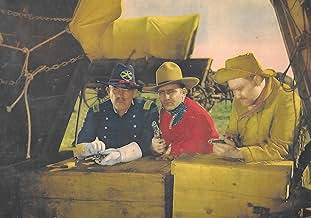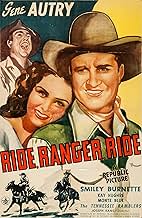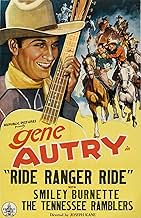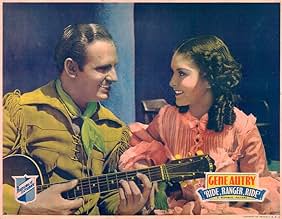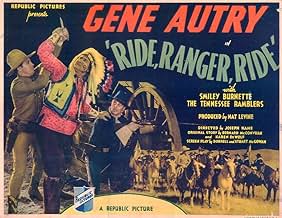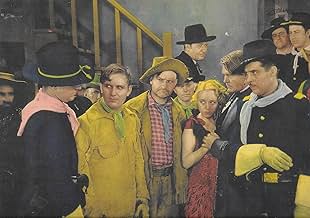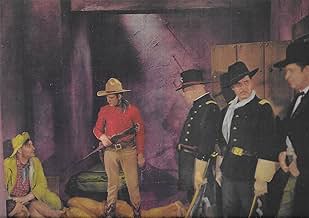Gene Autry enters the Cavalry, where he attracts the Colonel's daughter. When a jealous Lieutenant conspires to send Gene into an ambush, Gene loses a man and his group is ousted from the ar... Read allGene Autry enters the Cavalry, where he attracts the Colonel's daughter. When a jealous Lieutenant conspires to send Gene into an ambush, Gene loses a man and his group is ousted from the army.Gene Autry enters the Cavalry, where he attracts the Colonel's daughter. When a jealous Lieutenant conspires to send Gene into an ambush, Gene loses a man and his group is ousted from the army.
- Lieutenant Bob Cameron
- (as George Lewis)
- Colonel Summeral
- (as Robert E. Homans)
- Great Bear
- (uncredited)
- Goldie
- (uncredited)
- Civilian
- (uncredited)
- Wagon Trail Girl
- (uncredited)
- Soldier
- (uncredited)
- Member The Tennessee Ramblers
- (uncredited)
- Governor Morris
- (uncredited)
- Cavalryman
- (uncredited)
Featured reviews
The film begins with Gene and Max leaving the Texas Rangers and joining up to help the Cavalry. However, it soon becomes clear that the Colonel is a complete potato-head--with the brains to match. He loves the Indians and refuses to accept the idea that any of them could be in any way bad. Gene and Max (particularly Max) think the only good Indian is a dead one--and they are sure to say this again and again. In their estimation, Indians are an evil that needs purging--and they sound like they are about to go on some ethnic cleansing. So guess who is proved right in the end?! Aside from having a hate-filled and historically inaccurate script in regard to Indians, the film repeats the myth of the attack on the wagon train and circling the wagons--things that, despite being in films, didn't happen in the old west. An accurate view of the tribes would have been that SOME are pretty hostile and some are not--much like what you would say about any group of people. I don't say all this because I am Mr. Political Correctness but as a retired history teacher, I just like to see the facts straight. Overall, a stupid and terribly written film that is sure to ruffle a few feathers!
Solid writing in other regards should help to compensate for the unsavory flavors here. Indeed, there are some swell scene and story ideas on hand, and a little bit of cleverness. It's too bad that this is better about communicating its racism than it is about communicating its plot. Advancement of the narrative is meager next to poor attempts at humor (whether racist, or just otherwise falling flat), overbearing scenes of zip and zest and yelling, and tunes that in this case especially feel like empty filler, or an attempt to distract from wanting execution. Even scenes of action suffer as sped up footage is overused to try to foster artificial excitement. Moreover, while director Joseph Kane and the cast have demonstrated fine capability elsewhere, somehow in this instance the acting plainly struggles to feel authentic - from one to the next, it's either dull or overcooked, but never really on point.
All the ingredients are here for what should be another fun little western flick. Somewhere between the screenplay and the realization of it, however, all its best potential goes to waste, which would be bad enough without its worst aspects being brought front and center. Of all the features Autry made over his career, no few are pretty well made and enjoyable; I struggle to say the same of this one, as what light value it does have to offer is weighed against severe detractions. To be frank, there are far better movies you could be watching, and you don't need to spend time with this one. 'Ride, ranger, ride' - ride away, and never return.
The title song of the movie is one that has echoed in my head ever since I saw the film the first time, when I was about 10 or 11. I've never had any trouble remembering it. In fact, it was considered so good that it was used again in the last Autry film of 1936, "The Big Show."
The big, if a little brief, fist fight that Max Terhune and the other Rangers deliberately start in a saloon to try to get thrown out of the cavalry is one of the most realistic I've ever seen in an old Western. It ends with a close-up of Terhune and Smiley Burnette, but most of it is viewed in a room-wide shot, which would make it more difficult to have the fisticuffs look genuine. But they did!
Yes, Terhune does say, once, "The only good Indian is a dead Indian," or words to that effect. I don't remember Autry ever saying it. But remember this movie was made in 1936, long before the era of "political correctness." Even in the movies, people were more apt to say just what they thought in those days.
And yes, the horse race involving Gene and his rival for the affections of leading lady Kay Hughes, was a fine one. Gene Autry was a very accomplished rider -- which few of the reviewers are willing to acknowledge.
The final and unique plus for this Autry film, for ME, at least, was that Monte Blue, playing a fake Indian chief, and Max Terhune, were both native Hoosiers! Can't beat those actors from Indiana! And Max Terhune was a very talented ventriloquist and card shark, too.
Did you know
- TriviaFilm debut of Max Terhune.
- Quotes
[first lines]
Texas Ranger Gene Autry: Well, boys, here's where Rufe and I leave you.
Frog Millhouse: Aren't you goin' to San Antone with us?
Texas Ranger Gene Autry: Nope. We're ridin' to Fort Adobe. I've been made a lieutenant in the United State cavalry.
Frog Millhouse: What did they make out of you, Rufe?
Rufe Jones: They made me plain sick to talkin' about Texas bein' better off without us rangers and givin' our jobs to the United States cavalry.
- SoundtracksRide Ranger Ride
(1936) (uncredited)
Music and Lyrics by Tim Spencer
Played during the opening credits and Sung by Gene Autry and The Tennessee Ramblers
Reprised by them when the rangers are recommissioned
Reprised again near the end
Details
- Release date
- Country of origin
- Language
- Also known as
- Gränsriddarna från Texas
- Production company
- See more company credits at IMDbPro
- Runtime1 hour 3 minutes
- Color
- Aspect ratio
- 1.37 : 1
Contribute to this page


